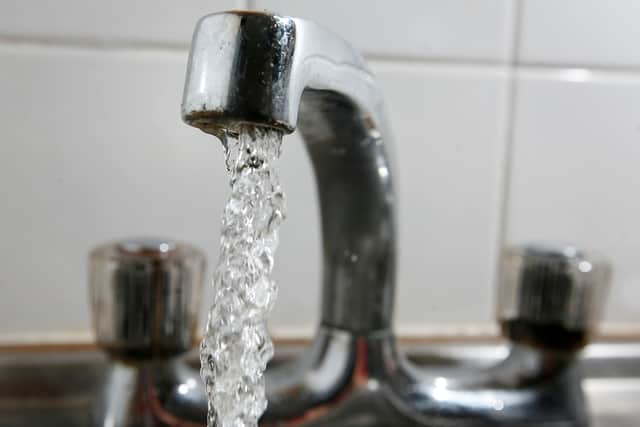Water bills: Charges to rise by 6% from April despite boycott growing in UK over sewage spills
and live on Freeview channel 276
The average household water and sewerage bill in England and Wales is set to rise by 6% from 1 April, adding an extra £27 on the bill bringing it up to £473, Water UK has confirmed. Regional variations and other individual factors, such as whether a customer is metered and how much water they use, means some households could face rises significantly above or below the average.
The Consumer Council for Water (CCW) has called for action from water companies to use some of their profits to help increase support for struggling households. Five water companies are currently using some of their own profits to help fund social tariffs, which rely heavily on customer cross-subsidies.
The five companies are Welsh Water, Severn Trent, Yorkshire Water, SES Water and United Utilities - but the CCW wants the rest of the industry to join in with putting their hand in their own pocket. The CCW says that more than two million customers are receiving some form of support from companies with paying their water bill including over 1.3 million low-income households in England and Wales receiving cheaper bills through companies’ social tariff schemes.
The social tariff schemes reduced bills for eligible customers by an average of £151 last year. However it said that an even greater number of customers in need of help are slipping through the net due to factors including low awareness and variations in eligibility criteria.


Mike Keil, chief executive of the Consumer Council for Water (CCW), said: “Almost a fifth of households say they struggle to pay their water bill and these rises will heap even greater pressure on low-income customers. If water companies are serious about rebuilding trust in the sector they should use some of their profits to help people who cannot afford another bill rise.”
“The water industry made a commitment five years ago to end water poverty in England and Wales and it needs to keep that promise. Crisis-hit households need immediate relief and the long-term security of knowing they can afford something as essential as water, without having to make painful sacrifices.”
As bills are set to rise the CCW has listed steps that households can take to dilute the impact of rising water bills and access support if they are struggling to pay. These include:
Trialling a water meter: Around 40% of households in England and Wales still not do not have a meter and some of these would benefit from switching. Not everyone will save with a meter but water companies will usually give you two years to trial one and switch back if you’re unhappy.
Reduce your use to save water, energy and money: Much of the water we use in the home comes from the hot tap. That means if you have a water meter you can double up on water and energy savings too.
See if you’re eligible for a cut-price social tariff: All water companies offer cheaper tariffs to low-income customers. Eligibility and the level of support varies from company to company but the average annual saving in 2022-23 was around £151.
Use the CCW’s Benefits Calculator to see if you can boost your income: CCW’s website features a calculator provided by charity Turn2Us which can help you work out whether you could be missing out on means-tested benefits.
The water bill hike comes as a boycott is growing in the UK with people deciding to withhold the sewage element part of their water bill in protest against the amount of raw waste being discharged into waterways. One woman, Caz Dennett, from Weymouth in Dorset is refusing to pay sewerage charges from Wessex Water because of its “poor performance and appalling pollution record.”
The 52-year-old told NationalWorld that she lives in a seaside town but “found out that Wessex Water were discharging huge volumes of sewage into the seas, right where holidaymakers and locals enjoy the beach, and where precious sea-life can be found.” She explained that in April last year she had “just had enough” and decided not to pay the sewerage part of her water bill as companies "will start listening when we turn off the money tap”.
Elizabeth Gerrish, 69, from Portreath in Cornwall, and her husband, have also stopped paying the sewage element of their water rates. She told NationalWorld she swims in the sea all year round but “very sadly” since 1 November she has not been able to swim at her home beach in Portreath due to sewage. She said she is “furious” as she is “advised not to swim on my beach."
The CCW said it "completely understands customers’ anger and frustration on this issue" but its "advice to people who approach us with a complaint regarding this matter is to continue paying their charges" as customers "who are considering boycotting payment should understand they could face debt recovery action from their water company." It adds: "This could negatively impact their credit rating and also potentially result in additional costs being added to their bill.”
Comment Guidelines
National World encourages reader discussion on our stories. User feedback, insights and back-and-forth exchanges add a rich layer of context to reporting. Please review our Community Guidelines before commenting.
